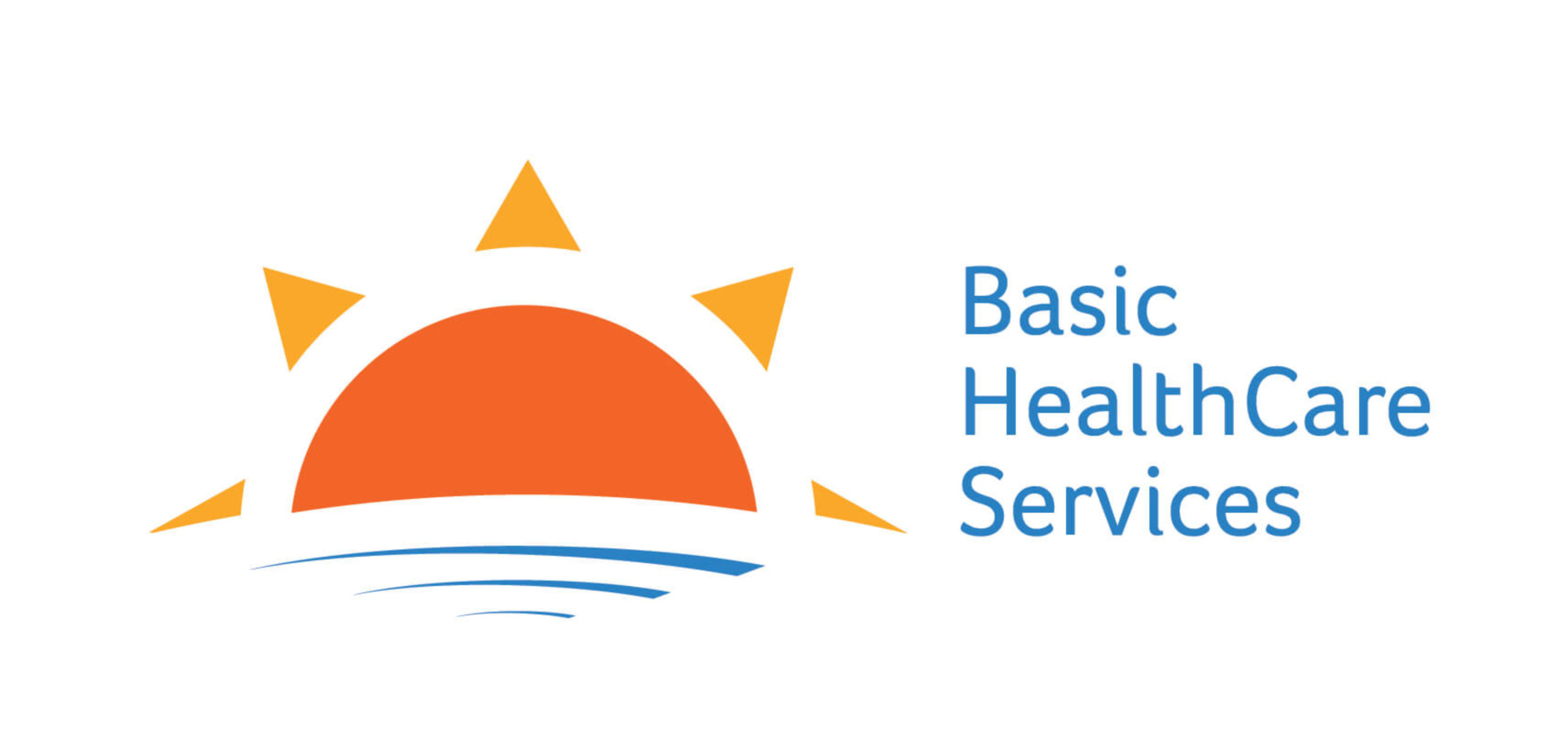A small plump, fair woman with an infectious smile and warm hug welcomes us to the PHC at Nithauwa. After the initial greetings we occupy the now-empty training hall to talk. I am immediately taken in by Chandrabhanu’s jolly demeanour. It is her warmth that makes me feel as if we know each other for a long time. But once I have heard her story, the same sweet smile appears to me like a thin veil that gently covers her anguish underneath.
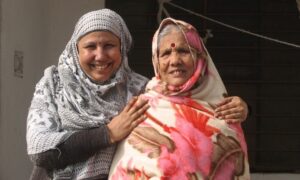
Chandrabhanu or Bhanu Sister begins by telling me about her happy childhood with three brothers who doted on her as their only sister. She studied till class nine in her village Saroda. In 1995, when she was just over eighteen, she was married to a man from Jhabua district of Madhya Pradesh, according to the customs of her community. Her in-laws ran a small sona-chandi jewellery shop in the village and she started tailoring clothes toaugment the family income. In 2007 tragedy struck when Bhanu’s husband died, leaving her to fend for herself and her two young children – a nine year old daughter and a six year old son. For three years, Bhanu stayed on in the marital home, taking care of the shop and the home. Around 2010 her father-in-law died and Bhanu’s brother asked her to come back to the parental home. She did come back but did not live more than a month with her parents – she preferred to move out to her own small home.
It is clear from the way Bhanu talks about him, that her brother was indeed an exceptional person. While many others in his place would have treated a widowed sister as an unwanted burden, he supported her in every way. It was he who encouraged her to take up ANM course. She registered in 2011 for the two years course. Things were going smoothly when she was forced to face yet another tragedy. In the second year of college, she discovered a small knot in her breast. Mammography and biopsy in Udaipur showed that she was suffering from breast cancer. Her brother helped her to go through the required surgery and chemotherapy in Ahmedabad. I notice that Bhanu Sister does not dwell upon the illness or the pain that it must have brought, but quickly moves to telling me about how she completed the course.
“My final exams were in Andhra Pradesh. I went there for twenty days, cleared my exams but instead of going home directly, I first went to Ahmedabad for chemotherapy before heading home.” Bhanu says.
The only time Bhanu sister appears sad and her eyes fill with tears is when she remembers how her beloved brother succumbed to tongue cancer in 2013. The grief of losing her pillar of strength was difficult to overcome and with a heavy heart Bhanu completed ANM and started looking for a job. After the loss of her brother, the responsibility of her two growing children seemed heavier than before.
Around this time, she came across an advertisement of the Rajasthan state government for the post of ‘Yashoda’ which entailed care of newborn babies in the Community Health Centre of Aspur district. “It was a district level interview and I did not know the first thing about how to go about it,” Bhanu laughs, “Some other applicants helped me to fill the forms and attach the required documents.”
The post required the candidate to be class VIII pass and Bhanu was obviously over-qualified. The CMHO who conducted the interview remembered her because of her appearance.
“There was a scarf around my head,” she said, pointing to her head which was wrapped in a white scarf, “The CMHO scolded me – why are you wearing this scarf for the interview? – he asked. I explained that I had undergone treatment for cancer and lost hair after chemotherapy. He asked me whether I was strong enough to work full-time with babies – it is a demanding work after all. I convinced him that I was strong and I needed the job for my two children.”
Although the administration wanted local women from Aspur they were willing to make an exception for Bhanu. She was selected and underwent training in Udaipur after which she worked more than a year in the CHC Aspur. It was here that she picked up the skills of applying the drip, helping in deliveries and taking care of newborn babies and mothers.
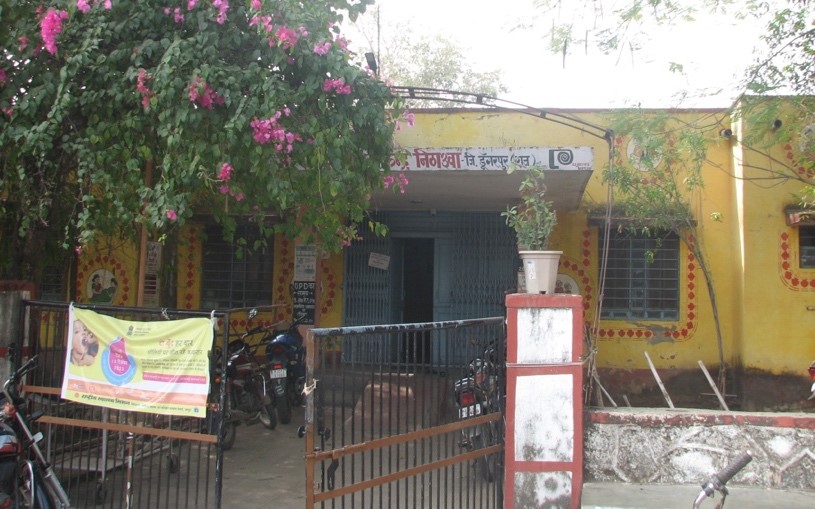 In 2015 she came to know about BHS run Primary Health Centre in Nithauwa and specifically that they had advertised for the post of ANMs. Once again she applied and was interviewed, this time in Aspur and was selected. It was her first job and Bhanu worked in the project for a couple of years, picking up knowledge and skills in primary healthcare before joining Basic Healthcare Services (BHS).
In 2015 she came to know about BHS run Primary Health Centre in Nithauwa and specifically that they had advertised for the post of ANMs. Once again she applied and was interviewed, this time in Aspur and was selected. It was her first job and Bhanu worked in the project for a couple of years, picking up knowledge and skills in primary healthcare before joining Basic Healthcare Services (BHS).
In 2015 BHS had taken over the government-run Nithauwa PHC in Dungarpur district under a Public-Private Partnership Model. Bhanu joined the staff on 17 August of that year.
“The Nithauwa PHC has several sub-centres under and I was ready to join anywhere, but they posted me to the PHC as a Lady Health Visitor (LHV).”
Bhanu remembers the initial days when the PHC had not yet been handed over by the government to the BHS. In fact, it took two months for the handing over procedures to be completed.
“It was a nightmare! This place was still to be renovated. During lunch hour we would go elsewhere to eat because there was no place to sit down. There was nothing outside except stones.” Her descriptions hardly hold true today as Nithauwa PHC is a well-maintained, fully functional, busy one.
Once the infrastructure was in place, BHS faced the next challenge of contacting the patients and winning over their confidence. “I remember that no would bring women here for deliveries and would go to quacks instead. We went door-to-door convincing people but they said that there are ghosts in the PHC. We said we were willing to sleep with the women and if at all there were ghosts, we were willing to be attacked first. Today we conduct as many as fifty deliveries a month. That is the change we have seen with our own eyes,” Bhanu explains.
“How does such change come about?” I asked.
“Through our initiative, by hard work…we have to do everything to reach patients. Once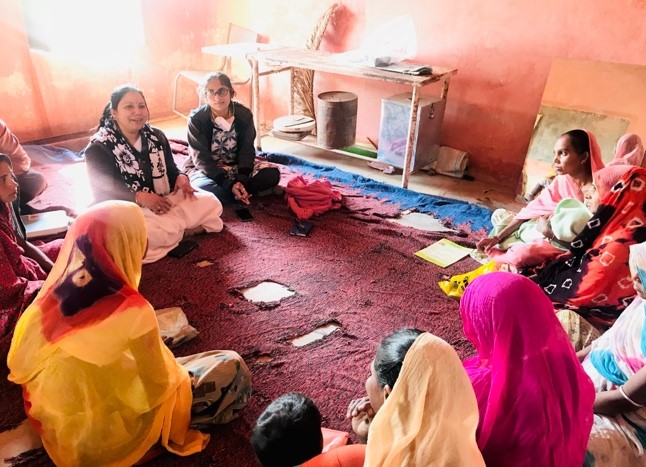 in the malaria season, a girl died of malaria. At that time, we surveyed the entire village and went door-to-door to explain the procedures. After that we made teams and went to every village in our work area – we have 23 revenue villages covered under this PHC, the last sub centre is 18 kilometres away – and made people aware about malaria. Today if people have fever they come to the PHC and say humari malaria ki jaanch kar do test us for malaria.”
in the malaria season, a girl died of malaria. At that time, we surveyed the entire village and went door-to-door to explain the procedures. After that we made teams and went to every village in our work area – we have 23 revenue villages covered under this PHC, the last sub centre is 18 kilometres away – and made people aware about malaria. Today if people have fever they come to the PHC and say humari malaria ki jaanch kar do test us for malaria.”
Bhanu sister’s face is constantly lit by a mischievous smile and she talks in an animated manner. She describes the challenge of helping T.B patients because of the stigma attached to the disease and the discrimination patients are subjected to. Till 2018 malnutrition was very high amongst the children and every child had to be screened for SAM and MAM, the parents and family members needed extensive counselling and mothers were made to attend demonstrations of nutritious recipes There were many kinds of food-related myths in the community – pregnant women were not allowed groundnuts, rice, curds, banana and Bhanu sister explains how they would demonstrate the importance of the very foods that they were denied. “If they said, we should not give bananas to pregnant women, we made sure to include banana-related information and recipes in our demonstrations!”
Time has passed quickly with Bhanu Sister. It is nearly lunch time. I asked her one last question to wrap up the interview, “Where do you live?” I had no idea that this innocuous question would elicit a startling reply.
“I used to live nearby, but now I have shifted to the quarters inside the PHC premises. I was diagnosed with ovary cancer last year and once again I had to undergo surgery and chemotherapy. I shifted inside the premises so that I can give two or three hours every day to the PHC without travelling and I can rest whenever I don’t feel well.”
My heart skips a beat as she narrates the harrowing details of the cancer diagnosis for the second time. I feel a sharp twinge of anger at the injustice of a wonderful person forced to undergo such physical and emotional torments again and again.
Unmindful of my subdued silence, she continues to tell me that because of her low immunity, she confines herself helping in data collation and reporting work. I feel deeply humbled by her tenacity and courage.
“Where do you get your energy from?” I ask her.
“From my colleagues and my work. When I worked as ‘Yashoda’ in the government hospital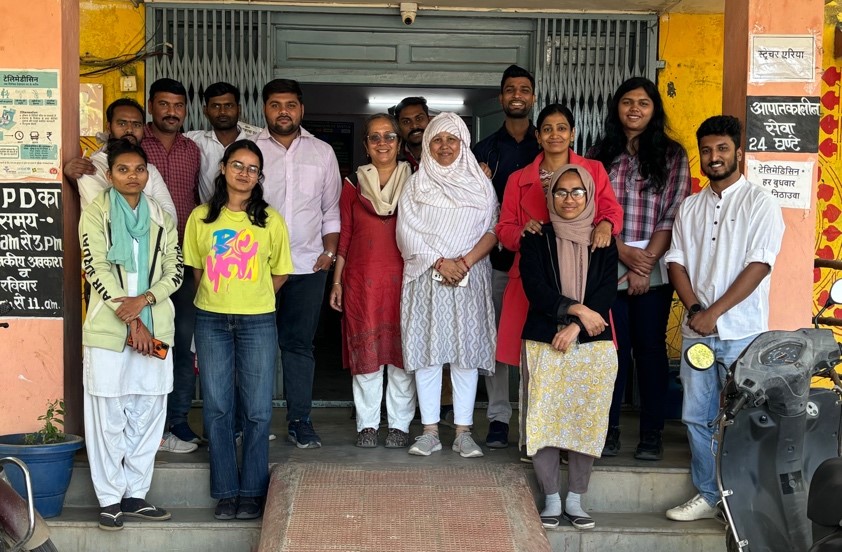 at Aspur, I took money from the patients like everyone else did. Here there is no corruption – I learned a life of dignity. I value patients; people feel they can approach us with their problems. We are equal here, we sit on the same level, and we eat together and share food – even doctors, even Sanjana Madam sits with us. We can openly share our opinions – if I feel we should try out a new way of approaching a community problem, I can suggest that to the team. BHS has given me not only training and instruments but confidence, knowledge and freedom hum free hain. What more does one want?” It is a deep question that she leaves us to ponder over.
at Aspur, I took money from the patients like everyone else did. Here there is no corruption – I learned a life of dignity. I value patients; people feel they can approach us with their problems. We are equal here, we sit on the same level, and we eat together and share food – even doctors, even Sanjana Madam sits with us. We can openly share our opinions – if I feel we should try out a new way of approaching a community problem, I can suggest that to the team. BHS has given me not only training and instruments but confidence, knowledge and freedom hum free hain. What more does one want?” It is a deep question that she leaves us to ponder over.
The rest of us take a break for lunch. Bhanu sister is the last one to join us, after taking stock of vaccines and medicines that had just arrived at the centre.
Written by: Paromita Goswami
